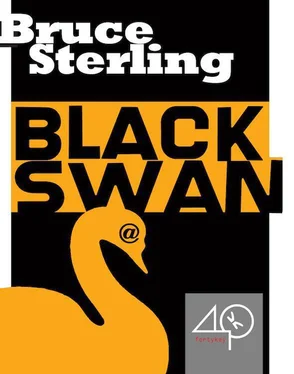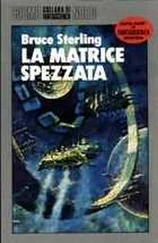Bruce Sterling - Black Swan
Здесь есть возможность читать онлайн «Bruce Sterling - Black Swan» весь текст электронной книги совершенно бесплатно (целиком полную версию без сокращений). В некоторых случаях можно слушать аудио, скачать через торрент в формате fb2 и присутствует краткое содержание. Жанр: Киберпанк, на английском языке. Описание произведения, (предисловие) а так же отзывы посетителей доступны на портале библиотеки ЛибКат.
- Название:Black Swan
- Автор:
- Жанр:
- Год:неизвестен
- ISBN:нет данных
- Рейтинг книги:3 / 5. Голосов: 1
-
Избранное:Добавить в избранное
- Отзывы:
-
Ваша оценка:
- 60
- 1
- 2
- 3
- 4
- 5
Black Swan: краткое содержание, описание и аннотация
Предлагаем к чтению аннотацию, описание, краткое содержание или предисловие (зависит от того, что написал сам автор книги «Black Swan»). Если вы не нашли необходимую информацию о книге — напишите в комментариях, мы постараемся отыскать её.
Black Swan — читать онлайн бесплатно полную книгу (весь текст) целиком
Ниже представлен текст книги, разбитый по страницам. Система сохранения места последней прочитанной страницы, позволяет с удобством читать онлайн бесплатно книгу «Black Swan», без необходимости каждый раз заново искать на чём Вы остановились. Поставьте закладку, и сможете в любой момент перейти на страницу, на которой закончили чтение.
Интервал:
Закладка:
“Whenever I move from world to world, I always materialize in the Piazza Vittorio Veneto,” he said, “because that plaza is so huge and usually pretty empty, and I don’t want to hurt anyone with the explosion. Plus, I know Torino-I know all the tech companies here, so I can make my way around. But once I saw a Torino with no electronics.”
I wiped clammy sweat from my hands with the cafe’s rough cloth napkin. “Tell me, Massimo, how did you feel about that?”
“It’s incredible. There’s no electricity there. There’s no wires for the electrical trolleys. There are plenty of people there, very well-dressed, and bright colored lights, and some things are flying in the sky… big aircraft, big as ocean-liners. So they’ve got some kind of power there-but it’s not electricity. They stopped using electricity, somehow. Since the 1980s.”
“A Turin with no electricity,” I repeated, to convince him that I was listening.
“Yeah, that’s fascinating, isn’t it? How could Italy abandon electricity and replace it with another power source? I think that they use cold-fusion! Because cold fusion was another world-changing event from the 1980s. I can’t explore that Torino-because where would I plug in my laptop? But you could find out how they do all that! Because you’re just a journalist, right? All you need is a pencil!”
“I’m not a big expert on physics,” I said.
“My God, I keep forgetting I’m talking to somebody from the hopeless George Bush World,” he said. “Listen, stupid: physics isn’t complicated. Physics is very simple and elegant, because it’s structured. I knew that from the age of three.”
“I’m just a writer, I’m not a scientist.”
“Well, surely you’ve heard of ‘consilience.’”
“No. Never.”
“Yes you have! Even people in your stupid world know about ‘consilience.’ Consilience means that all forms of human knowledge have an underlying unity!”
The gleam in his eyes was tiring me. “Why does that matter?”
“It makes all the difference between your world and my world! In your world there was a great physicist once… Dr. Italo Calvino.”
“Famous literary writer,” I said, “he died in the 1980s.”
“Calvino didn’t die in my Italy,” he said. “Because in my Italy, Italo Calvino completed his ‘Six Core Principles.’”
“Calvino wrote ‘Six Memos,’” I said. “He wrote ‘Six Memos for the Next Millennium.’ And he only finished five of those before he had a stroke and died.”
“In my world Calvino did not have a stroke. He had a stroke of genius, instead. When Calvino completed his work, those six lectures weren’t just ‘memos’. He delivered six major public addresses at Princeton. When Calvino gave that sixth, great, final speech, on ‘Consistency,’ the halls were crammed with physicists. Mathematicians, too. My father was there.”
I took refuge in my notebook. “Six Core Principles,” I scribbled hastily, “Calvino, Princeton, consilience.”
“Calvino’s parents were both scientists,” Massimo insisted. “Calvino’s brother was also a scientist. His Oulipo literary group was obsessed with mathematics. When Calvino delivered lectures worthy of a genius, nobody was surprised.”
“I knew Calvino was a genius,” I said. I’d been young, but you can’t write in Italian and not know Calvino. I’d seen him trudging the porticoes in Turin, hunch-shouldered, slapping his feet, always looking sly and preoccupied. You only had see the man to know that he had an agenda like no other writer in the world.
“When Calvino finished his six lectures,” mused Massimo, “they carried him off to CERN in Geneva and they made him work on the ‘Semantic Web.’ The Semantic Web works beautifully, by the way. It’s not like your foul little Inter-net-so full of spam and crime.” He wiped the sausage knife on an oil-stained napkin. “I should qualify that remark. The Semantic Web works beautifully- in the Italian language. Because the Semantic Web was built by Italians. They had a little bit of help from a few French Oulipo writers.”
“Can we leave this place now? And visit this Italy you boast so much about? And then drop by my Italy?”
“That situation is complicated,” Massimo hedged, and stood up. “Watch my bag, will you?”
He then departed to the toilet, leaving me to wonder about all the ways in which our situation could be complicated.
Now I was sitting alone, staring at that corked brandy bottle. My brain was boiling. The strangeness of my situation had broken some important throttle inside my head.
I considered myself bright-because I could write in three languages, and I understood technical matters. I could speak to engineers, designers, programmers, venture capitalists and government officials on serious, adult issues that we all agreed were important. So, yes, surely I was bright.
But I’d spent my whole life being far more stupid than I was at this moment.
In this terrible extremity, here in the cigarette-choked Elena, where the halfragged denizens pored over their grimy newspapers, I knew I possessed a true potential for genius. I was Italian, and, being Italian, I had the knack to shake the world to its roots. My genius had never embraced me, because genius had never been required of me. I had been stupid because I dwelled in a stupefied world.
I now lived in no world at all. I had no world. So my thoughts were rocketing through empty space.
Ideas changed the world. Thoughts changed the world-and thoughts could be written down. I had forgotten that writing could have such urgency, that writing could matter to history, that literature might have consequence. Strangely, tragically, I’d forgotten that such things were even possible.
Calvino had died of a stroke: I knew that. Some artery broke inside the man’s skull as he gamely struggled with his manifesto to transform the next millennium. Surely that was a great loss, but how could anybody guess the extent of that loss? A stroke of genius is a black swan, beyond prediction, beyond expectation. If a black swan never arrives, how on Earth could its absence be guessed?
The chasm between Massimo’s version of Italy and my Italy was invisible-yet all-encompassing. It was exactly like the stark difference between the man I was now, and the man I’d been one short hour ago.
A black swan can never be predicted, expected, or categorized. A black swan, when it arrives, cannot even be recognized as a black swan. When the black swan assaults us, with the wingbeats of some rapist Jupiter, then we must rewrite history.
Maybe a newsman writes a news story, which is history’s first draft.
Yet the news never shouts that history has black swans. The news never tells us that our universe is contingent, that our fate hinges on changes too huge for us to comprehend, or too small for us to see. We can never accept the black swan’s arbitrary carelessness. So our news is never about how the news can make no sense to human beings. Our news is always about how well we understand.
Whenever our wits are shattered by the impossible, we swiftly knit the world back together again, so that our wits can return to us. We pretend that we’ve lost nothing, not one single illusion. Especially, certainly, we never lose our minds. No matter how strange the news is, we’re always sane and sensible. That is what we tell each other.
Massimo returned to our table. He was very drunk, and he looked greenish.
“You ever been in a squat-down Turkish toilet?” he said, pinching his nose. “Trust me, don’t go in there.”
“I think we should go to your Italy now,” I said.
“I could do that,” he allowed idly,“although I’ve made some trouble for myself there… my real problem is you.”
Читать дальшеИнтервал:
Закладка:
Похожие книги на «Black Swan»
Представляем Вашему вниманию похожие книги на «Black Swan» списком для выбора. Мы отобрали схожую по названию и смыслу литературу в надежде предоставить читателям больше вариантов отыскать новые, интересные, ещё непрочитанные произведения.
Обсуждение, отзывы о книге «Black Swan» и просто собственные мнения читателей. Оставьте ваши комментарии, напишите, что Вы думаете о произведении, его смысле или главных героях. Укажите что конкретно понравилось, а что нет, и почему Вы так считаете.




